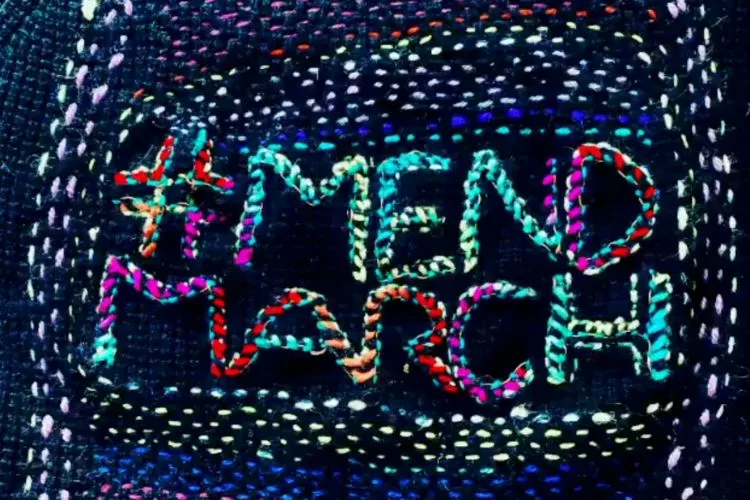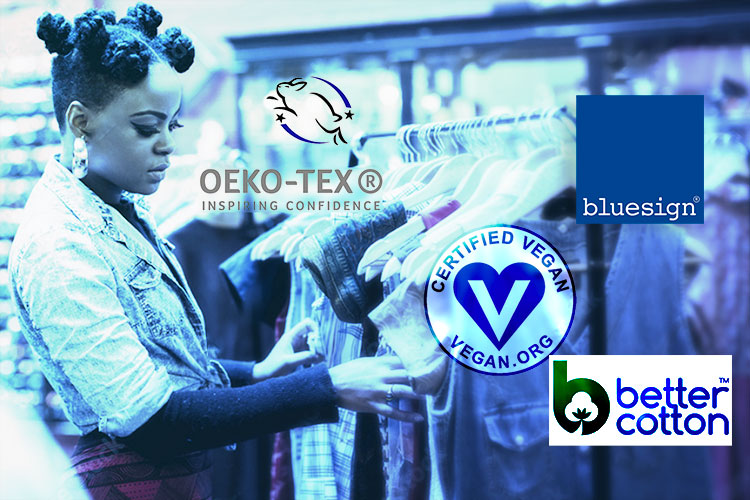
What is sustainable fashion? If you ask three people this you can easily get three different answers –much like the story of the blind men describing the elephant. One person might tell you it’s all about the materials –using organic cotton and other natural fibers. The next might tell you synthetics are actually more sustainable because they last longer. The third might tell you there’s no such thing as sustainable production at this point and the material doesn’t matter as long as it’s second hand.

And as we collectively learn more and widen our lens we take into account the garment workers and if they’re able to make a “living wage”, if the rivers are being polluted on the other side of the world to dye our jeans and the effects our secondhand clothes are having in the markets in Ghana. …to say it’s a lot is an understatement.
And with the overwhelming amount of greenwashing going on right now it’s tempting to think no companies can be believed. That makes it easier to declare that shopping sustainably is impossible and give up all efforts to be better. At No Kill we’ve decided to try another approach: asking sustainable fashion brands how they define it and how they work towards it.
We’re starting this with a look at Reformation. We’ve been curious about Reformation for awhile: How can a company that is regularly putting out new styles, staying on trend and at a relatively competitive price point be sustainable? We talked to Carrie Freiman, their Director of Sustainability to find out how Reformation does it.
No Kill Mag: How did you come to Reformation from your start as an early sustainable designer – what was the trajectory?
Carrie: I studied fashion design and marketing at Central Saint Martins in London and after graduation, moved to New York and started working as a designer. I started asking questions about how and where our products were being made and I was not satisfied with the response I received.
So, I attended the only graduate course of its time in “Socially Responsible and Sustainable Apparel Business” at the University of Delaware to learn about how things could be done better.
At the same time, I built one of the first sustainable materials libraries and consulted designers at the CFDA on how to source more sustainable materials. Within that time period, I also launched my own womenswear brand called Carrie Parry where I could combine my skill sets and passion for sustainability. After a few years, I decided that what motivated me most was sustainability and not the design front so I decided to try to work towards that goal. I joined Reformation in 2014 to help build the brand’s supply chain and sourcing strategies and currently as Director of Sustainability, I direct programs that range from sustainable sourcing, traceability, social and environmental responsibility, and sustainability messaging to help drive customer engagement.
How have you seen sustainable initiatives evolve in the fashion space over that time?
In recent years, customers have become more aware of the impact of their daily lives and the stuff they consume. They are empowered by information and the choices available to them and they really are the ones pushing brands forward to implement more sustainable products and practices. We’ve seen an increased number of brands implement critical sustainability initiatives and make larger commitments to the planet to meet this consumer demand, and at Reformation we’re really focused on continuing our mission to bring sustainable fashion to everyone.
How do you define sustainability?
At Reformation we define sustainability as a commitment to doing good for people and the planet, and infusing sustainable practices into every aspect of the business. Our sustainability framework focuses on 4 key pillars –people, planet, product, and progress. This covers: ensuring fair labor in our supply chain, sourcing low-impact fibers, designing for circularity, producing limited collections so we’re left without excess inventory, reducing and then offsetting 100% of our carbon, waste, and water footprints, and empowering our customers through education and reporting. Another key focus for us is innovation, as we work to push the industry forward towards a better shared future.

We love the line “Reformation – Making Water Savings Sexy”. Tell us more!
Reformation has been carbon neutral since 2014. It’s one of the easiest things we do to be sustainable.
In 2019, we launched “Carbon Is Canceled”—a series of programs that provide easier ways for everyone to connect to solutions. Our partnership with NativeEnergy, a non-profit carbon offset provider, allows consumers to visit our website and purchase climate credits. NativeEnergy will direct these purchases to support verified carbon offset projects, such as planting trees that naturally fight CO2 emissions. Reformation’s Climate Credit program offers five options ranging from $100 – $2,000 and 6-12 months of carbon offset coverage for individuals, families – even weddings, so there really are multiple ways to help reduce our carbon footprint.
We’ve also teamed up with Bonneville Environmental Foundation (BEF) to restore the water we do use and balance our entire water footprint. Since starting our partnership with BEF, we’ve helped restore over 465 million gallons of water by supporting projects that restore water across California and the Colorado River Basin.
Many of the brands we feature are smaller or focus on direct-to-consumer, but there are obviously a lot of larger clothing brands that could be more sustainable. Do you think Reformation’s approach to sustainability could be a model for other more traditional fashion brands?
Absolutely. Our business model is one that a lot of brands could follow. We release small assortments of limited collections based on customer demands. What starts as a sketch becomes a dress/skirt/top/pair of jeans in as little as 45 days, so we’re designing and making what customers want to wear now. Producing in limited quantities allows us to avoid excess inventory (our stock almost always sells out) and be responsive to what our customer wants more of, whether that’s a category, style, or material.
What are your thoughts on the explosion of 2nd hand clothing? Is it something you’re a part of? Do you consider deadstock to be in this realm?
The current fashion system operates on a take-make-dispose process. About 90% of clothing is thrown away long before the end of its useful life. Shopping vintage and second-hand clothing is another critical way to offset the incredible amount of waste we see. At Reformation we want to provide as many options as possible for consumers to shop sustainably. This includes: circularity initiatives like our RefRecycling program in partnership with thredUP, online vintage collections, our own vintage store in Los Angeles and offering one-of-a-kind vintage pieces at our Lower East Side location in NYC. We also love programs like Rent the Runway. We have an ongoing partnership with them, so customers can opt to rent clothing instead of buying new. Additionally, about 5% of our products are made out of deadstock fabrics and it’s definitely something we intend to continue.

How educated do you think your consumer is and/or do you feel it’s important to educate your consumers?
One of our main goals is to educate our customers on how to lead a more sustainable lifestyle. We do this by sharing information that will inspire our customers to make informed choices. We also release quarterly sustainability reports because we want to be completely transparent with our customers. The success of our sustainability initiatives is determined by how effortless they are to adopt. We know we can’t change consumer behavior overnight, but if we can make it easy for people to make more informed purchases, then we’ve done our job.
SB62, California’s Garment Workers Protection Act, which protects workers from being exploited recently passed even though there was serious opposition. Why did you feel like it was an important initiative? What would you say to the fashion brands that opposed it?
Signing on to SB62 is in line with Reformation’s ethos, centering sustainability and dignity for the people that make our clothes. As an LA-based brand it was an easy decision. We support this bill to improve working conditions and the wellbeing of garment workers in California. –which is home to America’s largest garment manufacturing sector. To the brands that opposed SB62, I would encourage them to look at the bigger picture. There is more than just brand profitability. Many individuals and stakeholders across the industry that will be positively affected by this legislation.
What are your top 3 picks that are currently available at Reformation? (yes this is a straight fashion question!)

I’m really excited about our Holiday Collection—I love the Mochi Dress because it’s so versatile; I can dress it up with a heel for a holiday party or wear it with some sneakers and tights when I’m on the go. For cozy winter nights at home with my family, my go-to is the Dara Cashmere Pant, they’re so comfortable but still look and feel elevated. Lastly, you can’t go wrong with our best-selling Cynthia High Rise Straight Jeans. I love the “Shasta” wash—it’s a staple in my closet regardless of the season.
What’s next for Reformation?
The industry is in need of some serious systemic change. We want to be a part of the solution. That could be helping to develop new fiber-to-fiber recycling, innovative next gen materials or supporting farms in their transition to regenerative farming. We see opportunity in collaborating with like-minded brands, suppliers and other stakeholders. We’re looking forward to applying the same approach and ethos to more categories to become a true lifestyle brand and solution.






